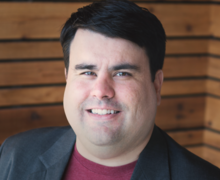Interview with Michael Downey
Sustainability of Open Source in International Development. A new approach from the United Nations Foundation

Michael Downey will give a talk about Sustainability of Open Source in International Development. A new approach from the United Nations Foundation at FOSDEM 2018.
Q: Could you briefly introduce yourself?
Hi everyone! My name is Michael Downey, and I’m the Director of Community for the DIAL Open Source Center. We’re a new program launched by the Digital Impact Alliance (DIAL), an initiative of the United Nations Foundation. DIAL is a partnership amongst some of the world’s most active digital development champions, including the Bill & Melinda Gates Foundation, the Swedish International Development Cooperation Agency (Sida), and the US Agency for International Development.
Our donors and our organization care deeply about the long-term impact & sustainability of the open source software projects used in international development. These tools unlock the potential to improve the lives of millions of vulnerable people around the world, and they are used in fields from health care to financial services to education and agriculture. If the projects were to fail, it could introduce significant harm to communities around the world.
Q: What will your talk be about, exactly? Why this topic?
In our talk, we’ll be introducing people to the challenges faced by adopting & using FOSS in international development, as well as the risks from failure of those projects to live up to their potential. We’ll then discuss our ideas about how to prevent those problems and “turbo-charge” these software projects to increase their reach and impact around the world. Finally, we’ll share our ideas about how we’re structuring the Open Source Center, and lead a short discussion about general sustainability challenges faced by free & open source software projects around the world.
Q: What do you hope to accomplish by giving this talk? What do you expect?
We’ll be highlighting a few examples of FOSS projects that serve the international development sector, including some of our earliest participating member projects. Our team is also always looking for new tools & platforms that can be adapted or improved to serve the world’s most vulnerable & resource-constrained communities, so we’re interested in getting the word out about our work to support those projects. We also know that many fans of open source software attending FOSDEM, also work for companies or other organizations that appreciate sponsoring efforts in social good – so we’re interested in talking with people that might want to explore those partnerships together. Finally, we also think that other projects faces similar challenges in sustainability, and hope that what we learn from our experiments will be useful in other sectors.
Q: Why do so many FOSS projects in the domain of international development fail?
Aside from reasons faced by other projects such as maintainer burn-out and deprecation by new technologies, projects that support international development often are structured around the interests of donors & other funders. When those projects with specialized funding “dry up” or the donors lose interest, there is often not the “grass roots” support to sustain a project over the long term. Our Center is designed to mitigate many of those risks and help projects become more sustainable & impact more people.
Q: How will the new Open Source Center at the Digital Impact Alliance tackle the challenges these projects are facing?
One phrase we like to use when talking about our Center is “co-investment in shared resources”. Many of the people & skills needed for highly effective FOSS projects are not things that are needed in large quantities. Volunteers are often scarce in areas like documentation, design, or program management, and it doesn’t make sense for one project to hire someone “full time” or even “part time”. As a result, we’ll be working to gather resources that can be shared by multiple projects serving the international development space.
Q: How can interested projects participate and what do they get out of this? Can they get a grant or other types of support?
Our Center is just getting started, but at launch, we’re offering participating members opportunities for direct technical assistance and mentorship for their FOSS projects, as well as financial support, too. For example, we recently just closed a round of funding for grants to support projects’ “dirty jobs” – areas that they may have neglected due to lack of volunteer or other support, or otherwise ignored over the years. We will also be looking for funding or other volunteer support to help amplify our work, so if using FOSS in this type of work is interesting to you or your organization, we’d love to meet you!
Q: Have you enjoyed previous FOSDEM editions?
Having previously attended FOSDEM, I can attest to how much I love the energy and sheer number of people gathered together to celebrate exciting new developments in free and open source software. It’s an amazing weekend to come together to learn from each other and inspire each other, and I’m looking forward to meet as many new people as possible!

Creative Commons License
This interview is licensed under a Creative Commons Attribution 2.0 Belgium License.